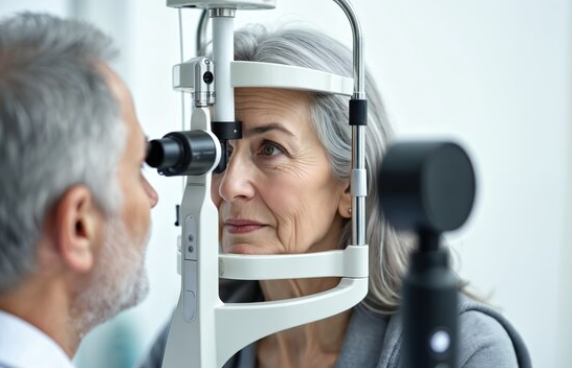Protecting Your Vision During Diabetes Awareness Month: What You Should Know About Diabetic Retinopathy

Each November, Diabetes Awareness Month serves as a reminder that managing diabetes isn’t just about blood sugar, it’s also about protecting your vision. Diabetic retinopathy is one of the most common complications of diabetes and a leading cause of blindness among working-age adults. Fortunately, with regular eye exams, healthy habits, and modern treatments, vision loss from diabetic eye disease is often preventable.
Understanding the Risk
Anyone living with diabetes, Type 1 or Type 2, is at risk for developing diabetic retinopathy, which occurs when high blood sugar damages the tiny blood vessels in the retina, the light-sensitive tissue at the back of the eye.
“People with Type 1 diabetes typically don’t develop advanced diabetic retinopathy within the first five years after diagnosis,” explains Dr. Leal of Austin Retina Associates. “However, those with Type 2 diabetes may already have some degree of eye damage by the time they’re diagnosed, which makes early and regular eye exams critical.”
Certain factors increase the risk, including:
- Poorly controlled blood sugar (A1c above 7%)
- High blood pressure or cholesterol
- Smoking
- Pregnancy, which can temporarily heighten risk and requires closer monitoring
Prevention Starts with Whole-Body Health
Preventing diabetic retinopathy begins with taking charge of your overall health. “Keeping blood sugar levels in a healthy range, especially aiming for an A1c below 7%, significantly lowers the risk of developing or worsening eye disease,” says Dr. Leal.
He adds that controlling blood pressure and cholesterol are equally important since these also affect the blood vessels that nourish the eyes.
In addition to medical management, small daily choices can make a big difference:
- Quit smoking
- Stay physically active
- Eat a balanced diet rich in vegetables and whole foods
- Schedule annual, comprehensive dilated eye exams, even if your vision seems fine
Early detection through these exams allows ophthalmologists to identify changes before vision loss occurs.
Modern Treatments Offer Hope
If diabetic eye disease does develop, today’s treatments are more effective than ever at preserving and restoring sight.
“For diabetic macular edema—a condition caused by leaky blood vessels in the back of the eye, injections of medication directly into the eye have been a standard treatment for nearly 20 years,” says Dr. Leal. “Recently, newer medications have become available that may reduce how often these injections are needed, offering more convenience for patients while maintaining good control of the disease.”
Laser photocoagulation, an in-office procedure that helps stop abnormal blood vessel growth, continues to play a key role in treatment. And for advanced cases involving bleeding or retinal detachment, vitreoretinal surgery has become much safer and more effective thanks to decades of surgical advancements.
Diabetic retinopathy doesn’t have to mean vision loss. By keeping diabetes well-managed, making healthy lifestyle choices, and scheduling regular visits with a retina specialist, you can protect your sight for years to come.
If you or a loved one has diabetes, now is the perfect time to schedule your annual diabetic eye exam with Austin Retina Associates. Early detection saves sight – this month and every month.
Schedule Your Diabetic Eye Exam with Austin Retina Associates
Austin Retina Associates treats a wide range of retinal conditions. Our experienced team of retina specialists in Austin are dedicated to improving your vision and quality of life.
Contact us at 800-252-8259, or request an appointment online at one of our retina treatment centers located in Austin and throughout Central Texas.
For the latest Austin Retina news, visit our blog or follow us on Facebook and Instagram. Also, please note our South Austin office has relocated! The new address is: 4544 S Lamar Blvd, Suite 645, Austin, TX 78745. Please contact us at (800) 252-8259 with questions or to book an appointment.